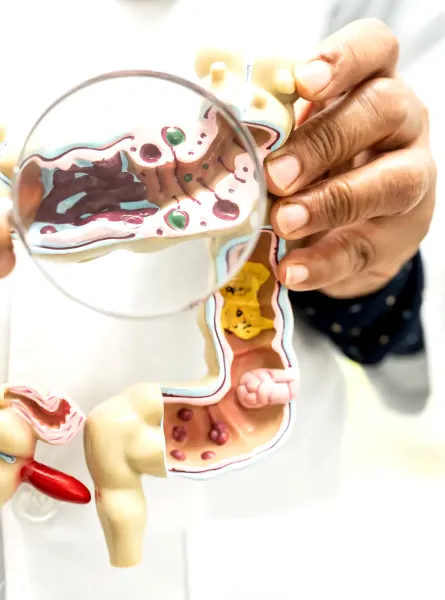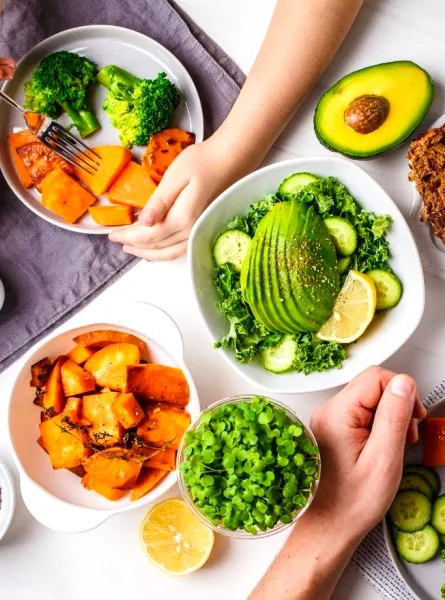
Welcome to the fascinating world of the gut microbiome! Imagine a vibrant ecosystem of microorganisms, primarily bacteria, living in our intestines and tirelessly working for our health. These tiny allies are essential for optimal digestion and regulating our immune system (1). Taking care of our microbiome is an investment in our overall well-being! In this article, discover simple and practical tips for maintaining a balanced microbiome.
1. Incorporate Fermented Foods
Foods like yogurt, sauerkraut, kimchi, miso, tempeh, and kombucha are fermented by bacteria, making them rich in probiotics that help strengthen your gut flora (2).
Try these recipes from our dietitians and nutritionists to enjoy the benefits of fermented foods:
- Kefir and Oatmeal Bowl: Perfect for starting the day.
- Pork and Kimchi Fried Rice: For a spicy and nutritious touch to your meals.
- Miso Vinaigrette: Perfect for enhancing your salads.
- Kombucha Mocktail Margarita: A refreshing and healthy drink.
- Tempeh Satay Skewers: A tasty and protein-rich option.
2. Consume Fibre-Rich Foods
Fibre is essential for nourishing the good bacteria in your gut, promoting a diverse and healthy microbiome (1). To integrate more fibre into your diet, prioritize plant-based foods like fruits, vegetables, legumes, whole grains, nuts, and seeds. For more inspiration, check out our Top 15 Fibre-Rich Foods.
Try these recipes from our dietitians and nutritionists to enrich your diet with fibre:
- Raspberry Bites: For a healthy and delicious snack.
- Roasted Quebec Vegetables: For a balanced and nutritious meal.
- Air Fryer Chickpea Tacos: For an easy-to-make and delicious meal.
- Carrot Cake Oatmeal: Perfect for starting the day right.
- Low-Carb Granola: Ideal for breakfast or a snack.
3. Reduce Your Intake of Artificial Sweeteners
Artificial sweeteners can disrupt your microbiome's balance by promoting the growth of harmful bacteria (3). To preserve your gut flora, limit these substances in your diet when possible. Incorporate fresh fruits into your diet for a natural source of sweetness beneficial to your microbiome.
4. Eat a Variety of Foods
A diverse diet ensures a varied intake of nutrients, which encourages a rich and balanced gut flora. The 30-plant challenge, which involves consuming 30 different types of plant-based foods each week, is an excellent way to improve gut health.
5. Stay Hydrated
Water is crucial for maintaining a healthy intestinal lining and the proper functioning of gut bacteria (4). Here are some ideas to stay well-hydrated, especially during intense heat:
- Drink water regularly throughout the day, using reminders on your phone (you can also try flavoured waters)
- Keep a water bottle handy at all times
- Consume water-rich fruits, such as melons and cucumbers
- Include soups and broths in your menu
6. Adopt Good Stress Management Habits
Stress can negatively affect your microbiome. Stress management techniques such as meditation and yoga can help maintain a healthy balance (5). Here are some effective practices:
- Practice deep breathing exercises
- Maintain regular physical activity
- Share your concerns with friends or loved ones
- Use meditation and yoga apps like our health and wellness platform KoalaPro: activate your free trial today!
- Engage in creative activities such as drawing, painting, or writing
- Spend time in nature to relax and recharge
By incorporating these practices into your routine, you can improve your overall well-being and promote a healthy gut microbiome.
Improve Your Gut Health with a Dietitian Nutritionist
In summary, there are many ways to optimize the health of your gut microbiome. Whether by diversifying your diet with fibre and fermented foods, staying well-hydrated, or learning to better manage your stress, you contribute to the health of your microbiome in one way or another. For personalized advice and nutritional follow-up, make an appointment with a registered dietitian nutritionist at TeamNutrition.
References
- Jones, E. I., & Koonin, E. V. (2024). Deciphering the complexity of microbial communities in the human gut. Science, 375(6586), 405-410. https://doi.org/10.1126/science.adj9223
- Wastyk, H., Fragiadakis, G., Gardner, C., & Sonnenburg, J. (2021). Fermented-food diet increases microbiome diversity, decreases inflammatory proteins. Cell, 375(6586), 405-410. https://doi.org/10.1126/science.adj9223
- Zia, S. (2022). Artificial sweeteners alter gut bacteria in humans. The Scientist. https://www.the-scientist.com/artificial-sweeteners-alter-gut-bacteria-in-humans-70395
- Gasbarrini, A., & Ponziani, F. R. (2021). Intestinal Barrier in Human Health and Disease. International Journal of Environmental Research and Public Health, 18(23), 12836. https://doi.org/10.3390/ijerph182312836
- Stoler, D. (2023, July). Exploring the Link Between the Gut Microbiome and Anxiety. Psychology Today. https://www.psychologytoday.com/us/blog/the-resilient-brain/202307/exploring-the-link-between-the-gut-microbiome-and-anxiety





